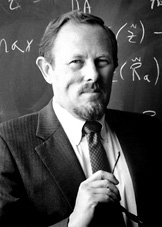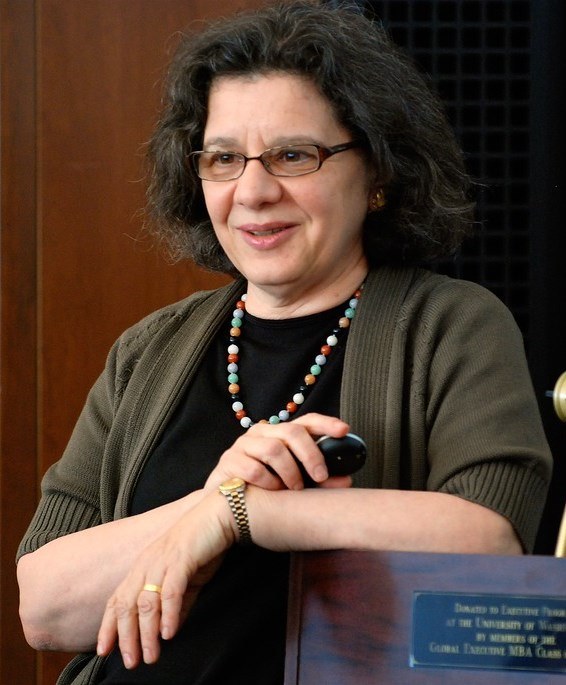Masters of Finance
Foster’s Department of Finance and Business Economics has quietly become a global powerhouse in research and teaching
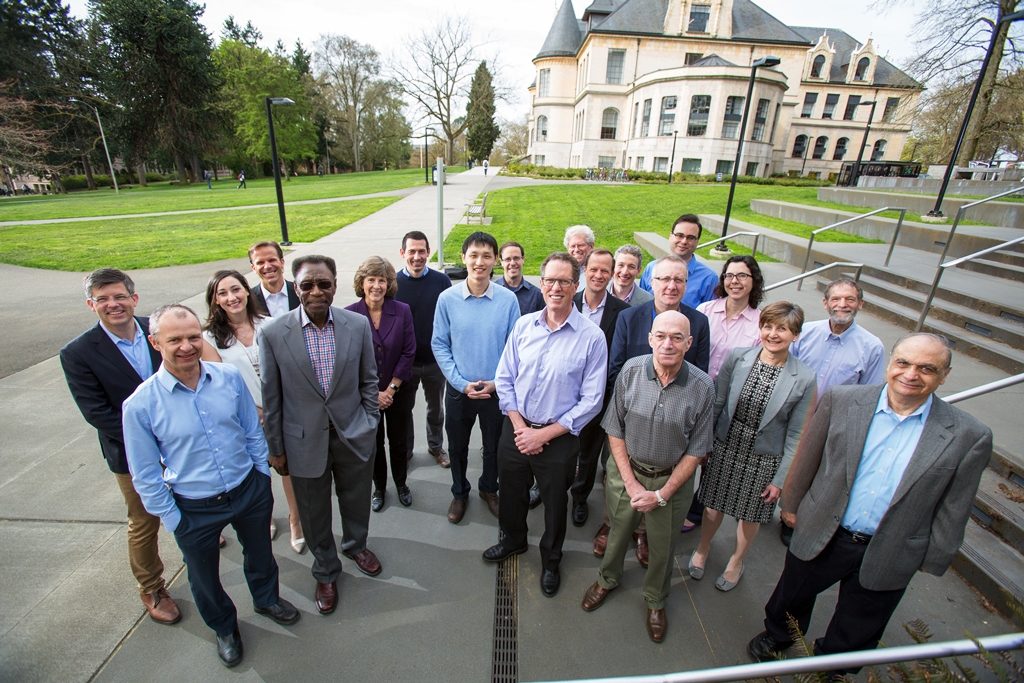
The professors and senior lecturers of the UW Foster School’s Department of Finance and Business Economics.
The UW Foster School of Business is a long way from Wall Street.
An entire continent separates Seattle, the globally renowned catalyst of innovation, and New York, the globally recognized capital of finance. And to those who care about financial pedigree, that’s a division as metaphoric as it is geographic.
Just don’t try to tell Lauren Krainski (MBA 2018) that Foster is not a finance school.
The second-year MBA student lit up her investment banking internship at Deutsche Bank last summer, earning lead roles on live M&A deals and fielding the questions of her fellow interns, most of whom hailed from the traditional finance powers and came with some serious advantages—finance backgrounds, deep dives into investment banking practicums, vast industry alumni networks. Pedigree.
What they didn’t have? Thomas Gilbert and Sarah McVay and Stephan Siegel and Lance Young in their heads. Krainski credited her personal A-team of Foster professors with instilling in her the critical concepts of financial modeling, financial statement analysis and M&A negotiations so deeply and indelibly that her scale-up to Wall Street’s unrelenting pace became, comparatively, a piece of cake. And for any question that arose over the summer, they were only an email or phone call away.
“I almost could not believe how well I was prepared—and prepared versus everyone else who had so many more advantages and opportunities than I had,” says Krainski. “Foster is an amazing place for finance.”
Performance over pedigree
This assertion is more than one woman’s opinion.
The Department of Finance and Business Economics is ranked #5 in the world in research productivity in the discipline’s top four journals over the year 2017—and #4 when you weight each school’s productivity by its number of research faculty.
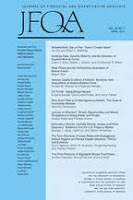 Foster faculty members serve on the editorial review boards of every major finance journal, including the top-four Journal of Finance and Quantitative Analysis, which has been published by the school since 1966.
Foster faculty members serve on the editorial review boards of every major finance journal, including the top-four Journal of Finance and Quantitative Analysis, which has been published by the school since 1966.
Finance has also produced many of the UW’s most-effective educators, including 10 of the first 20 recipients of the PACCAR Award for Excellence in Teaching, the Foster School’s highest honor.
So what’s the secret sauce? How did Foster become world-class in finance so quietly—so remotely (to those who subscribe to an East Coast bias)?
On the shoulders of giants
Department chair Jarrad Harford, the Paul Pigott-PACCAR Professor in Business Administration, believes that current successes have built upon a solid foundation.
The early Foster School was led by a string of visionary economists, including Stephen Miller, Howard Preston and Austin Grimshaw. Dean Kermit Hanson recruited Stephen Archer, who chaired the department through the 1960s, leading the field’s transformation from descriptive to prescriptive research using advanced statistical analyses. Archer worked alongside William Sharpe, who conducted most of his Nobel-Prize winning work developing the Capital Asset Pricing Model (CAPM) while on faculty in the 1960s. And Sharpe’s student and research collaborator Nancy Jacob became the first woman to lead the Foster School—or any major American b-school—as dean in the 1980s.
The most important bridges to the present include emeritus professors Larry Schall, who chaired the department for much of the past three decades, Alan Hess, who brought a deep knowledge of financial institutions and monetary policy that earned him a UW Distinguished Teaching Award, and Rocky Higgins, a PACCAR and UW Distinguished Teaching Award winner and faculty director of the Pacific Coast Banking School.
And generations of Foster grads will fondly remember PACCAR Award winners Ali Tarhouni, who departed to lead reform in his native Libya during the Arab Spring, and Karma Hadjimichalakis, who made such an impression with her level-headed macroeconomic lessons that she was honored by the U.S. House of Representatives upon her untimely death in 2010.
A golden age
These trailblazers have paved the way to what can only be called a golden age of finance at Foster. Harford says it has everything to do with the current lineup of exceptional scholars and educators who have assembled in PACCAR Hall. He credits a vital infusion of private support as essential to attract—and retain—some of the foremost minds in the ultra-competitive field of finance.
This includes some of the discipline’s most eminent modern scholars (Harford, Philip Bond, Ran Duchin, Jon Karpoff), inquisitive innovators (Kathy Dewenter, Chris Hrdlicka, Andy Siegel, Stephan Siegel), academic leaders (Bill Bradford, Avi Kamara, Paul Malatesta), and transformational educators (Thomas Gilbert, Jennifer Koski, Lance Young—“who could teach self-impalement and people would line up for their course,” Harford jokes).
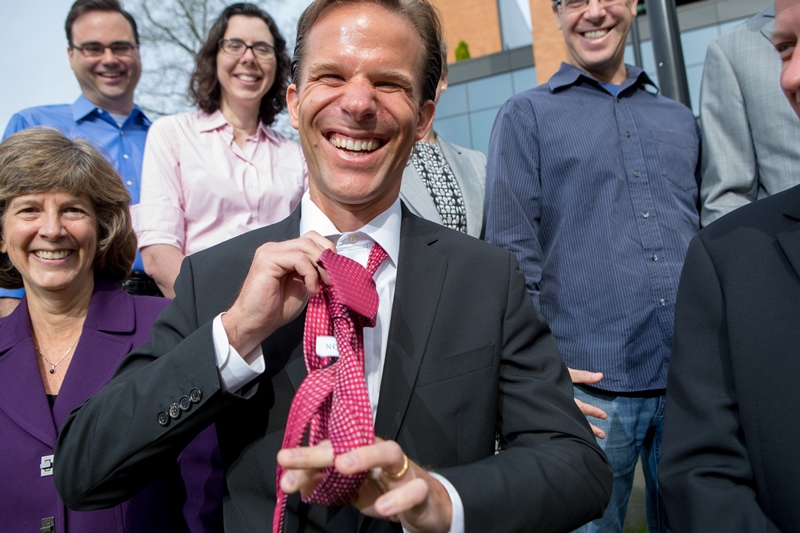 They choose to stay, he believes, because of the many assets of Seattle, the Foster School’s world-class campus and, perhaps most of all, a department with a culture of genuine collegiality, an environment scarcely found in the sharp-edge world of finance.
They choose to stay, he believes, because of the many assets of Seattle, the Foster School’s world-class campus and, perhaps most of all, a department with a culture of genuine collegiality, an environment scarcely found in the sharp-edge world of finance.
“Success breeds success,” adds Harford. “It’s a global market for academic talent, and everyone knows where everyone is. Here, we’ve got a productive place with people you want to be working with and talking to every day.”
The wide world of finance
Research productivity may be the most objective measure of a finance faculty’s quality. But teaching is the most meaningful for students. Today, 20 percent of Foster MBAs and 25 percent of Foster BAs graduate into finance positions.
Count Alina Moraru (MBA 2013) a satisfied customer.
“The finance education I received at Foster not only prepared me well for a career in corporate finance, but also gave me the breadth and knowledge needed to understand the ‘why’ behind my work and the broader implications of my decisions,” says Moraru, a senior finance manager at Amazon. “The knowledge gained at Foster enables me to see the bigger financial picture of my company, which becomes increasingly important as I grow my career.”
Luis Silva-Behrens (BA 2006), an executive director at JPMorgan Chase, describes his finance training at Foster as “complete and well-rounded,” and his overall experience as “dynamic. I didn’t necessarily know it then, but a dynamic undergraduate experience is a valuable asset for starting in today’s business world. A rigorous academic curriculum, a vibrant and diverse student body, numerous opportunities to enhance my experience with deeply rooted student organizations and other extracurricular offerings… all of these experiences helped prepare me to work in an industry that is challenging, fast-paced and always changing.”
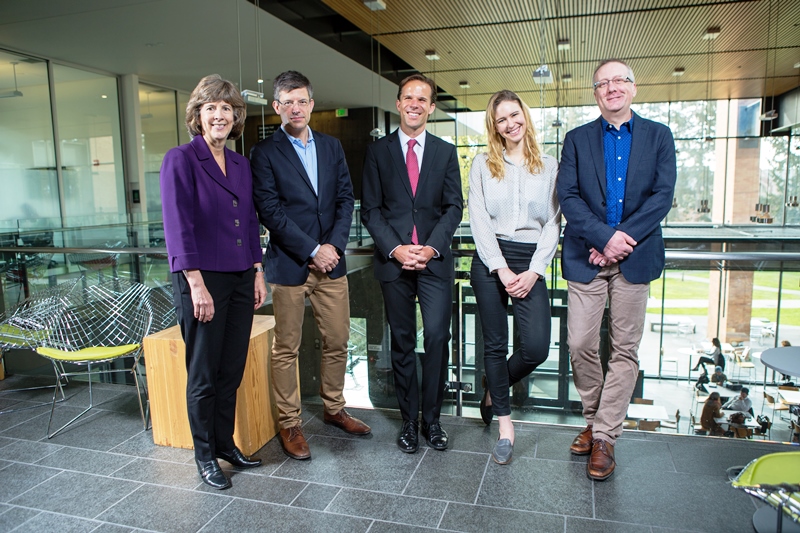
MBA Lauren Krainski (second from right) formed a close educational partnership with Jennifer Koski, Stephan Siegel, Thomas Gilbert and Lance Young.
As for Lauren Krainski, despite having written her ticket to a lucrative career in investment banking, she decided that her passion lies outside of Wall Street. Seattle, it turns out, is full of finance opportunities she finds infinitely more fascinating.
While finishing her degree, Krainski rose to associate director of the new startup incubator at the Allen Institute for Artificial Intelligence. “Being able to make high-level finance decisions on emerging AI companies while also applying my skills in diligence and research is a pretty thrilling proposition,” she says.
Applying finance to innovation… what could be more Foster than that?
Who’s Who in Foster Finance
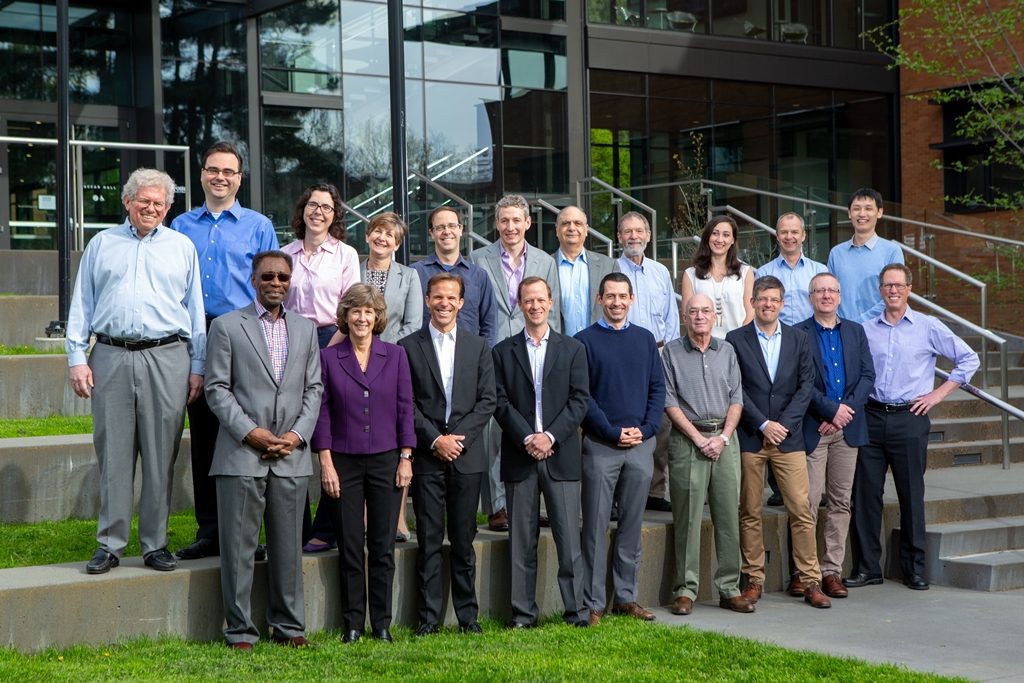 Philip Bond (Edward E. Carlson Distinguished Professor in Business Administration) – a leading theorist with enormous stature in the academic community from his studies on a wide range of finance topics. He’s also co-editor of the preeminent Journal of Finance and past president of the Financial Theory Group.
Philip Bond (Edward E. Carlson Distinguished Professor in Business Administration) – a leading theorist with enormous stature in the academic community from his studies on a wide range of finance topics. He’s also co-editor of the preeminent Journal of Finance and past president of the Financial Theory Group.
Bill Bradford (Business and Economic Development Endowed Professor) – a former dean of the Foster School and long-time faculty director of the Consulting and Business Development Center whose research delves into under-examined areas of minority enterprise, wealth creation and discriminatory financing.
Kathy Dewenter (Joshua Green Family Endowed Professor) – a former faculty director of the Global Business Center and researcher of complex topics in global banking, Dewenter became renowned for her ability to balance rigorous expectations with genuine care in the classroom, earning her the 2016 PACCAR Award for Excellence in Teaching. She passed away in February.
Ran Duchin (William A. Fowler Endowed Professor) – the associate editor of two of the discipline’s most influential journals is a world-renowned empiricist with a broad portfolio of research interests that include behavioral finance and banking.
Thomas Gilbert (Associate Professor) – one of Foster’s finest educators who has won two PACCAR Awards, seven MBA Core Professor of the Year nods and a spot in Poets & Quants’ “40 Under 40” for his ability to demystify the most complex concepts in finance. His research investigates asset pricing, endowment investment and economics.
Debra Glassman (Senior Lecturer) – the longtime faculty director of the Global Business Center whose ability to teach macroeconomics with deep expertise and currency puts her in high demand in and out of the classroom.
Jarrad Harford (Paul Pigott-PACCAR Professor in Business Administration) – one of the world’s leading scholars on mergers, cash holdings, CEO and director incentives and institutional share ownership, Harford also finds the time to chair the department, serve on the editorial board of three top journals, share his expertise on a global stage and still teach undergrads at Foster.
Chris Hrdlicka (Assistant Professor) – a scholar’s scholar with incisive research on big-picture questions about asset pricing, risk and optimal portfolio policy and controversial topics such as the management of university endowments.
Avi Kamara (William W. Alberts Endowed Professor) – an essential part of the Foster fabric for more than three decades, Kamara is the former department chair (2002-2006), associate editor of the JFQA (1996-2005) and an asset-pricing specialist with a knack for making highly technical topics, such as derivatives, intelligible.
Jonathan Karpoff (Washington Mutual Endowed Chair in Innovation) – an associate editor at every major finance journal and a prolific researcher in corporate finance best known, perhaps, for his revelations on the consequences of fraud. Among numerous career honors, Karpoff was recently named a fellow of the Financial Management Association, joining an elite group of Nobel laureates and the biggest names in financial economics.
Jennifer Koski (Kirby L. Cramer Endowed Chair) – an elemental force in the classroom who has earned three PACCAR Awards—and virtually every other teaching award—for her legendary ability to demystify the most complicated of concepts, while also making important contributions to the study of financial markets.
Paul Malatesta (Norman J. Metcalfe Professor) – one of the department’s longtime stalwarts and managing editor, for more than 30 years, of the Journal of Finance and Quantitative Analysis, one of the top four journals in finance, due in no small part to his presence.
Ed Rice (Associate Professor) – a major figure in Foster’s doctoral program and a shrewd thinker in any seminar, Rice is also the school’s resident microeconomist who shares this expertise each spring in the MBA State of the Economy Forum.
Florian Schulz (Assistant Professor) – a promising newcomer with some interesting insights on political economies.
Tracy Seslen (Senior Lecturer) – the resident expert in real estate who developed a real estate finance course and an annual conference for industry professionals.
Andy Siegel (Grant I. Butterbaugh Professor) – the man who, literally, wrote the book on Practical Business Statistics (and teaches sublimely to everyone from undergrads to execs) has also created fundamental financial models and brought his statistical insights to further fields ranging from investing to design automation to election prediction to systems biology.
Stephan Siegel (Michael G. Foster Endowed Professor) – an expert in international asset pricing who took a huge risk to delve into the genetic origins of financial behaviors, yielding seminal papers in a fascinating emerging discipline.
Lea Stern (Assistant Professor) – a newcomer whose promising research ranges from corporate governance to the applications of artificial intelligence and machine learning in finance.
Mark Westerfield (Associate Professor and Michael G. Foster Endowed Fellow) – a towering young theorist with a knack for overturning firmly held beliefs in asset pricing, behavioral finance and corporate finance—then making his correction seem intuitive.
Lance Young (Principal Lecturer) – another of Foster’s finest educators with a PACCAR Award and professor-of-the-year honors across undergraduate and MBA programs, Young’s Socratic style has made case-based courses in entrepreneurial finance and M&A essential experiences. He also was instrumental in establishing Foster’s Student Investment Fund.
Yao Zeng (Assistant Professor) – fresh out of Harvard’s doctoral program with a dissertation on entrepreneurial finance adorned with awards, Zeng is now delving into the mysteries of FinTech.
Joining this summer:
Yang Song (Assistant Professor) – a productive young scholar from Stanford who studies asset pricing and financial intermediation.
Chris Parsons (Michael G. Foster Endowed Professor) – a research powerhouse from USC who is as renowned for his creative approaches to big-picture questions in finance as he is for dynamism in the classroom.

